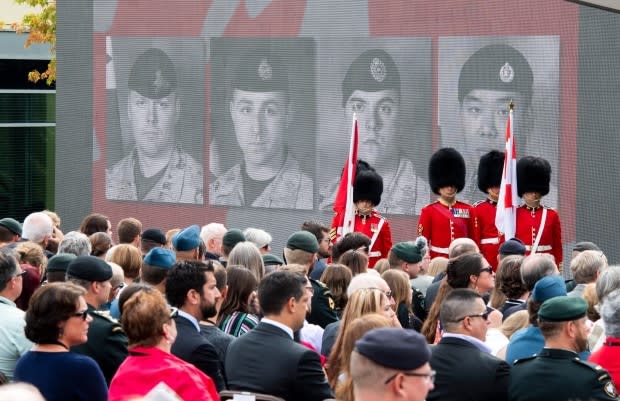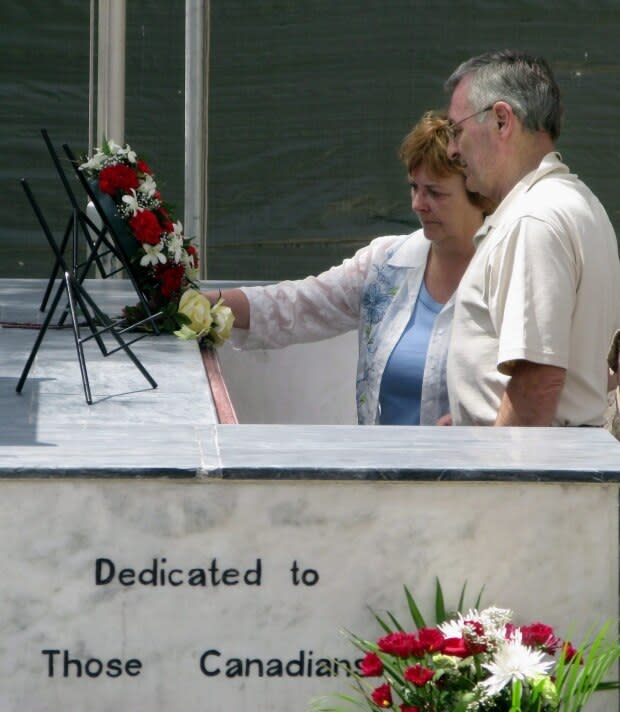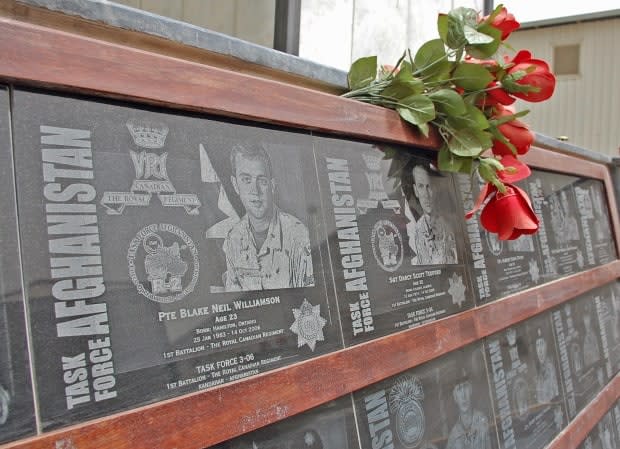'What they did was noble': Soldiers who died in Afghanistan remembered at re-dedication of memorial
It started as a simple two-tonne boulder, a nondescript hunk of rock plucked from the lonely Afghan wilderness and hung with a few plaques, but through almost a dozen years of war and heartbreak it has morphed into a major symbol of national sacrifice.
The cenotaph re-dedicated Saturday in a large public ceremony in Ottawa looks almost nothing like the original, humble soldier's monument first unveiled in 2003 by a grief-stricken combat engineer.
It is bigger, more elegant and — as was demonstrated last spring — exceedingly more powerful.
More than 1,100 people, including almost 700 family members who lost loved ones, attended the service on the grounds of the new National Defence Headquarters.

The event started with a video of Canada's war in Afghanistan and a montage of the faces to the fallen to the theme of Band of Brothers.
Gov. Gen. Julie Payette delivered an eloquent address, speaking to the families of the fallen and the sacrifice of their loved ones. She quoted from the Bible, saying there is no greater love than to lay down ones life for one's friends
"If these words have meaning — and I believe they do — then the men and women we honour today loved greatly. What they did was noble and their sacrifice was dear," Payette said.
The country's top military commander, Gen. Jonathan Vance, choked back tears on several occasions.
Among the fallen is Cpl. Nick Bulger, who was a member of Vance's team when the general was combat commander of the Canadian mission. Bulger was killed in a roadside bomb attack on Vance's convoy in 2009.
Vance spoke about how the cenotaph was not only a place of sorrow, but also of inspiration. He said he often felt in Kandahar the fallen were still watching over them.
"I remember having just arrived back for my second tour going to the cenotaph and seeking out Cpl. Nick Bulger's plaque, and saying, 'Hey Nick, I'm back. Wish me luck.' And it felt like he was there," he said.
"Know this: Although shrouded in sadness and pain the legion of fallen on that cenotaph were also a source of strength to those facing the daily challenges of combat."

The ceremony follows public anger and frustration that occurred in May when the memorial hall, which houses the cenotaph, was opened in a private ceremony that included only senior government officials and high-ranking members of the military.
Family members were excluded and the public wasn't notified until three days after the commemoration.
Catherine Jane Byers, the mother of Pte. David Robert James Byers, was one of the ones who wrote in to the defence department to express her outrage.
"We're the ones that live with this every day," she said. "We're the ones that celebrate birthdays. See our grandchildren grow up without a father. That is our reality."
Her granddaughter, whom she brought to the ceremony, was born a few months after her son was killed.
After learning about the families' distress, Vance apologized for the frustration and hurt feelings and the federal government organized Saturday's event, allowing the family of each fallen soldier to bring up to six members, at public expense, to Ottawa.
The gesture is deeply appreciated, said Jim Davis, of Bridgewater, N.S., whose son Cpl. Paul Davis was killed in the rollover of an armoured vehicle in 2006.

The families of fallen soldiers are tight-knit and have a support group that meets regularly. Shortly after the controversy over the private ceremony erupted, almost three dozen families were in Ottawa where defence officials took them on a low-key tour of the memorial hall in June.
Any lingering hard feelings, said Davis, evaporated once they saw the cenotaph and the reverence in which the memories of their loved ones were being treated.

"I was feeling the spirit of all those fallen soldiers because they were all there in a group," he told CBC News, "It's just highly emotional. And for anybody that's in grief, I think it's a wonderful experience to be in that room, in that hall."
His sentiment was echoed by Silver Cross Mother Theresa Charbonneau, whose son, Cpl. Andrew Grenon, was killed in 2008.
"In one breath I'm smiling, and then in the next breath there's tears running down my face," she said. "I don't know how else to say it. It's just overwhelming."
Part of the angst surrounding the cenotaph has long involved the choice of location. It is behind the security perimeter at the new defence complex in west Ottawa and not easily accessible for the general public, which the families had wanted.
Many families on Saturday said they now accept the decision and appreciate the care being taken to preserve the memory of their loved ones.
The cenotaph — portions of which were displayed on Parliament Hill six years ago and subsequently toured the country — originally stood outside of the Canadian task force headquarters at Kandahar Airfield.

It was dismantled and brought back to Canada following the end of combat operations in 2011.
At the time, it included 192 black granite plates etched with the photographs of Canadian soldiers and civilians killed during the decade-long conflict, as well as those of Americans who died while under Canadian command in Kandahar.
A proposal by the previous Conservative government to create a separate, lasting, public memorial to Afghanistan has been stuck in bureaucratic disagreements across four different departments and agencies.
Shortly after last spring's controversy, the National Capital Commission announced a site for that new monument had been chosen. The monument will be installed at Lebreton Flats, near the Canadian War Museum.
A design competition is expected to follow.


